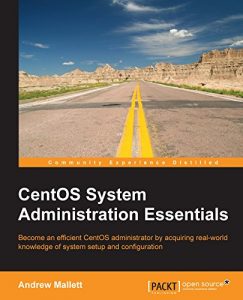About This Book
- Centralize user accounts in openLDAP and understand how Directory can be at the back-end of many services
- Learning Puppet to centralize server configuration will free up your time as configuration is handled just once on the configuration server
- A step-by-step guide that covers the very popular Linux Distribution CentOS 6.5 with easy-to-follow instructions.
Who This Book Is For
If you are a Linux administrator who is looking to gain knowledge that differentiates yourself from the crowd, then this is the book for you. Beginners who have a keen interest to learn more about Linux administration will also progress quickly with this resourceful learning guide.
What You Will Learn
- Conquer the command line using shortcuts in the shell and within the editor Vim
- Analyze the booting of CentOS utilizing MBR, GRUB, and Plymouth
- Gain an understanding of the filesystem structure of hard links, inodes, and data using stat and ls
- Manage your software installations with YUM
- Handle your services as they begin to migrate from System V scripts
- Establish centralized account information using openLDAP directory services
- Centralize the configuration management of CentOS using Puppet, enabling updates from Puppet Master to be distributed to the clients
In Detail
CentOS is widely respected as a very powerful and flexible Linux distribution, and it can be used as a web server, file server, FTP server, domain server, or a multirole solution. It is designed to handle the more demanding needs of business applications such as network and system administration, database management, and web services. CentOS is self-sufficient and fast while working, with the added benefit of global acceptance as a large number of the world's web servers run on it.
This book not only concentrates on the basics, but also supplements your existing knowledge on subject areas that are important in the Enterprise market, such as directory services, security configuration management, and web-based architecture. By the end of this book, you will be able to manage an Enterprise Linux network focused on management-centralized configuration, user management, and filesystem enhancements by covering everything from the latest filesystem advances with BTRFS through to learning about the new web server on the block—Nginx.






